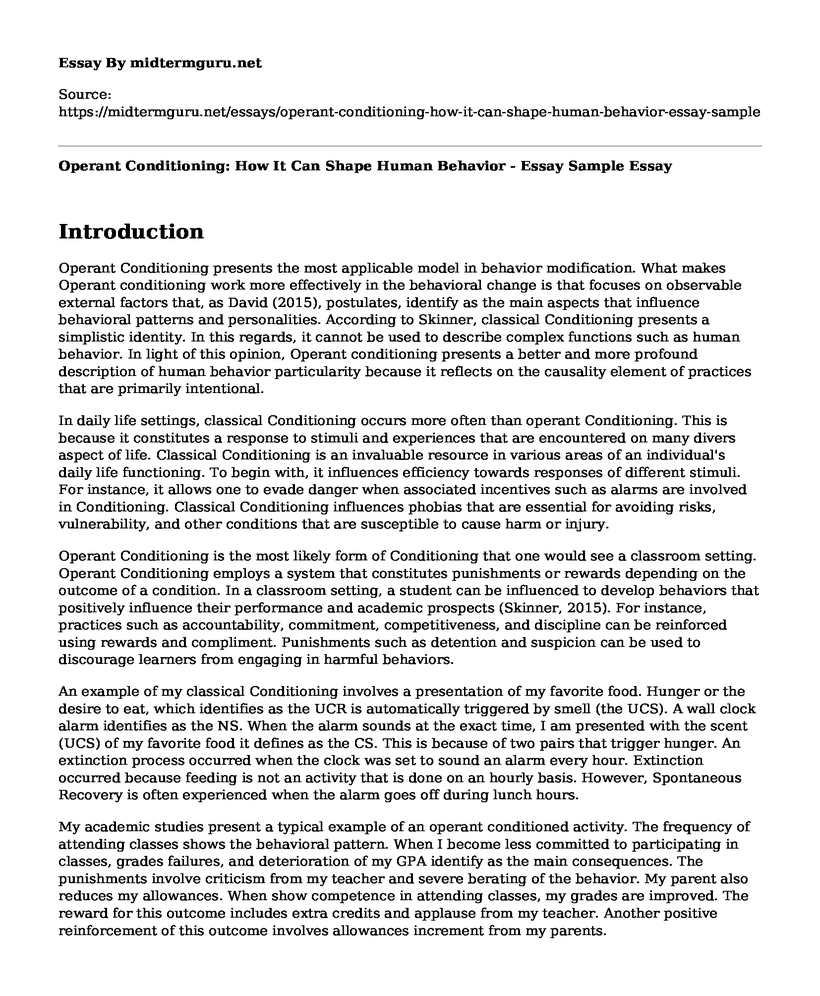Introduction
Operant Conditioning presents the most applicable model in behavior modification. What makes Operant conditioning work more effectively in the behavioral change is that focuses on observable external factors that, as David (2015), postulates, identify as the main aspects that influence behavioral patterns and personalities. According to Skinner, classical Conditioning presents a simplistic identity. In this regards, it cannot be used to describe complex functions such as human behavior. In light of this opinion, Operant conditioning presents a better and more profound description of human behavior particularity because it reflects on the causality element of practices that are primarily intentional.
In daily life settings, classical Conditioning occurs more often than operant Conditioning. This is because it constitutes a response to stimuli and experiences that are encountered on many divers aspect of life. Classical Conditioning is an invaluable resource in various areas of an individual's daily life functioning. To begin with, it influences efficiency towards responses of different stimuli. For instance, it allows one to evade danger when associated incentives such as alarms are involved in Conditioning. Classical Conditioning influences phobias that are essential for avoiding risks, vulnerability, and other conditions that are susceptible to cause harm or injury.
Operant Conditioning is the most likely form of Conditioning that one would see a classroom setting. Operant Conditioning employs a system that constitutes punishments or rewards depending on the outcome of a condition. In a classroom setting, a student can be influenced to develop behaviors that positively influence their performance and academic prospects (Skinner, 2015). For instance, practices such as accountability, commitment, competitiveness, and discipline can be reinforced using rewards and compliment. Punishments such as detention and suspicion can be used to discourage learners from engaging in harmful behaviors.
An example of my classical Conditioning involves a presentation of my favorite food. Hunger or the desire to eat, which identifies as the UCR is automatically triggered by smell (the UCS). A wall clock alarm identifies as the NS. When the alarm sounds at the exact time, I am presented with the scent (UCS) of my favorite food it defines as the CS. This is because of two pairs that trigger hunger. An extinction process occurred when the clock was set to sound an alarm every hour. Extinction occurred because feeding is not an activity that is done on an hourly basis. However, Spontaneous Recovery is often experienced when the alarm goes off during lunch hours.
My academic studies present a typical example of an operant conditioned activity. The frequency of attending classes shows the behavioral pattern. When I become less committed to participating in classes, grades failures, and deterioration of my GPA identify as the main consequences. The punishments involve criticism from my teacher and severe berating of the behavior. My parent also reduces my allowances. When show competence in attending classes, my grades are improved. The reward for this outcome includes extra credits and applause from my teacher. Another positive reinforcement of this outcome involves allowances increment from my parents.
References
David, L. (June 19, 2015), Classical and Operant Conditioning (Skinner)," in Learning Theories.
Skinner, B. F. (2015). 'Superstition'in the pigeon. Journal of experimental psychology, 38(2), 168
Cite this page
Operant Conditioning: How It Can Shape Human Behavior - Essay Sample. (2023, Feb 11). Retrieved from https://midtermguru.com/essays/operant-conditioning-how-it-can-shape-human-behavior-essay-sample
If you are the original author of this essay and no longer wish to have it published on the midtermguru.com website, please click below to request its removal:
- Procrastination Among the College Students - Essay Example
- Article Analysis Essay on Mental Health Issues in Long-Term Solitary And "Supermax"
- Eating Pork Is Morally Unacceptable - Argumentative Essay
- Research Paper on Social, Moral Issues
- Suicide: A Rising Killer in the Modern World - Research Paper
- Jose Depression - Case Study
- Moral Philosophy: Examining Right and Wrong in Existence - Essay Sample







